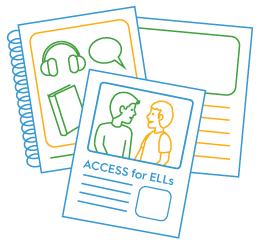Resources/Recursos
Featured Resources



All resources/Todos los recursos
Filter resources by:
Resources/Recursos
WIDA Screener Online Accommodations Checklist
A checklist for tracking the accommodations a student receives on WIDA Screener Online.
Resource Details View Download NowReleased June 2023
WIDA Screener Paper Accommodations Checklist
A checklist for tracking the accommodations a student receives on WIDA Screener Paper.
Resource Details View Download NowReleased June 2023
WIDA Screener for Kindergarten Accommodations Checklist
A checklist for tracking the accommodations a student receives on WIDA Screener for Kindergarten.
Resource Details View Download NowReleased June 2023
Kindergarten ACCESS Accommodations Checklist
Checklist for IEP teams to prepare for administering WIDA ACCESS for Kindergarten.
Resource Details View Download NowReleased June 2023
Rating Multilingual Learners' Written Language Consistently
This Focus Bulletin explores the process of evaluating student writing, and examines how educators can consistently evaluate the written language of multilingual learners. It provides strategies for educators to support evaluations that generate focused and helpful feedback for students.
Resource Details View Download NowReleased June 2023
District Level Analysis of ELL Growth
This research project explored the patterns of district-level ELL “growth” for the 2007-2011 time period and identified the existence of “high-flying” and “low-cruising” districts within ACCESS for ELLs in terms of ELL growth.
Published May 2013
Author: Narek Sahakyan
Resource Details View Download Now
Released May 2023
Alternate ACCESS: Entendiendo el puntaje de su niño
Envíe este volante a los hogares con los estudiantes, junto con el Informe individual del estudiante de Alternate ACCESS. Este folleto provee información sobre cada aspecto de la puntuación incluida en el informe. Utilice esta guía en español para ayudar a los padres a comprender qué significan las puntuaciones y cómo se utilizan.
Detalles del recurso Ver Descargar ahoraReleased April 2023
Impact of ability range restriction on item characteristics in ACCESS multistage adaptive testing
This report describes how different student ability restrictions may affect item characteristics in the ACCESS multistage adaptive testing, and presents options for item administration in field testing.
Resource Details View Download NowReleased April 2023
Examining English Learner Testing, Proficiency, and Growth: Before, During, and “After” the COVID-19 Pandemic
This report examines English learner testing, proficiency, and growth in the years surrounding the COVID-19 pandemic. This research builds on an October 2021 report on the impact of the pandemic, and includes data from the 2021-22 ACCESS for ELLs test administration. Findings indicate that in some grades and language domains EL's average proficiency and growth have returned to pre-pandemic levels. However, for most grades and language domains the evidence points to a continuing impact of COVID-19 on English learners’ English language development.
Published April 2023
Author: Narek Sahakyan, Glenn Poole
Released April 2023
ACCESS for ELLs Prueba de desempeño linguístico en inglés
Este informe brinda información sobre el nivel de desarrollo del alumno en la prueba de desempeño linguístico en inglés ACCESS for ELLs.
Detalles del recurso Ver Descargar ahoraReleased February 2023
Sample Alternate ACCESS Individual Student Report for Educators
This version of the report is for educators and provides information about a student’s scores on the Alternate ACCESS English language proficiency test. This test is based on the WIDA Alternate English Language Development Standards and is used to measure students’ progress in learning English. Scores are reported as Language Proficiency Levels and as Scale Scores.
Resource Details View Download NowReleased February 2023
Supporting Multilingual Learners' Language Growth Through Language Development Portfolios
This Focus Bulletin illustrates how teachers and students can use language development portfolios to interpret and document language growth. The bulletin follows the story of how a grade-level team introduced portfolios to their practice, posing several questions the team asked as they refined their usage. It closes by offering two sample tools that teachers can use and adapt to capture multilingual learners’ language growth using modified Proficiency Level Descriptors (PLDs) from the WIDA English Language Development Framework, 2020 Edition.
Published: December 2022
Authors: Fernanda Marinho Kray, Margo Gottlieb, Lynn Shafer Willner
Released December 2022
Educational Justice Through Policy
In this Focus Bulletin, WIDA revisits landmark legislation and policies that shaped language education in the U.S. It presents unintended consequences on programming and instruction of bi/multilingual students; showcases how field practitioners address language policy and its consequences; and includes tools for reflection, collaboration, professional learning and community engagement.
Published November 2022
Author: Mariana Castro
Released November 2022
Scaffolding Learning for Multilingual Students in Math
This WIDA Focus Bulletin provides examples of specific macro-scaffolding and micro-scaffolding practices in action in a math classroom and includes guidance for developing these scaffolding practices over time.
Published November 2022
Authors: Jen Daniels, Ruslana Westerlund
Released November 2022
Gathering and Reflecting on Families’ Language and Cultural Goals
This WIDA Snapshot focuses on how you can gather information and reflect on the language and cultural goals families have for their children.
Resource DetailsReleased November 2022
Recaudando y reflexionando sobre los objetivos lingüísticos y culturales de las familias
Este resumen informativo se enfoca en cómo puede recaudar información y reflexionar sobre los objetivos lingüísticos y culturales que las familias tienen para sus hijos/as.
Resource DetailsReleased November 2022
WIDA MODEL Flyer
Are you looking for an interim ELP assessment to predict student performance on ACCESS for ELLs? This flyer provides information on why you should try WIDA MODEL.
Resource Details View Download NowReleased August 2022
ACCESS for ELLs: Entendiendo el puntaje de su niño
Envíe este volante a los hogares con los estudiantes, junto con el Informe individual del estudiante de ACCESS for ELLs. Este folleto provee información sobre cada aspecto de la puntuación incluida en el informe. Utilice esta guía en español para ayudar a los padres a comprender qué significan las puntuaciones y cómo se utilizan.
Detalles del recurso Ver Descargar ahoraReleased July 2022
Using ACCESS for ELLs to Promote Beneficial Outcomes for English Learners Flyer
This flyer provides a breakdown of the role school/district-level educators, state-level administrators and WIDA play in using or developing ACCESS Online and Paper test scores, interpreting scores and making decisions based on scores to best serve English learners. Plus, there’s a checklist outlining the positive and intended outcomes of using ACCESS Online and Paper scores, so you’ll always know what it takes to ensure your students have the supports they need.
Resource Details View Download NowReleased July 2022
Young Multilingual Children in Pennsylvania
In this study, completed for the Pennsylvania Office of Child Development and Early Learning, we explore the perceptions, experiences and decision-making of 13 parents of young multilingual children, ages birth to 5 years. The focus revolves around children’s language learning and development, family engagement practices and children’s participation in early care and education (ECE) programs.
Published 2020
Resource Details View Download NowReleased May 2022




